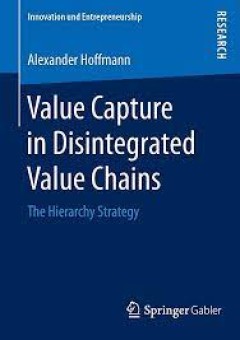Filter by

Markets for technology :the economics of innovation and corporate strategy
The past two decades have seen a gradual but noticeable change in the economic organization of innovative activity. Most firms used to integrate research and development with activities such as production, marketing, and distribution. Today firms are forming joint ventures, research and development alliances, licensing deals, and a variety of other outsourcing arrangements with universities, te…
- Edition
- -
- ISBN/ISSN
- 9780262267366
- Collation
- 1 online resource (xi, 338 pages) :illustrations
- Series Title
- -
- Call Number
- -

Management :inventing and delivering its future
"The MIT Sloan School of Management: 50th anniversary."The MIT Sloan School of Management perspective on future management challenges.The MIT Sloan School of Management, as conceived by the legendary General Motors chairman Alfred P. Sloan, was founded in 1952 to draw on the scientific and technical resources of MIT and approach the problems of management with the rigorous research practices fo…
- Edition
- -
- ISBN/ISSN
- 9780262277334
- Collation
- 1 online resource (xiv, 309 pages) :illustrations
- Series Title
- -
- Call Number
- -

Retooling :a historian confronts technological change
A humanistic account of the changing role of technology in society, by a historian and a former Dean of Students and Undergraduate Education at MIT.When Warren Kendall Lewis left Spring Garden Farm in Delaware in 1901 to enter MIT, he had no idea that he was becoming part of a profession that would bring untold good to his country but would also contribute to the death of his family's farm. In …
- Edition
- -
- ISBN/ISSN
- 9780262286299
- Collation
- 1 online resource (xv, 252 pages)
- Series Title
- -
- Call Number
- -

Specificity and the macroeconomics of restructuring
A proposal that the notion of specificity-the idea that factors of production are not interchangeable-can provide a unified framework to analyze and understand a wide variety of macroeconomic phenomena stemming from the transactional environment and micro.OCLC-licensed vendor bibliographic record.
- Edition
- -
- ISBN/ISSN
- 128209856X
- Collation
- 1 online resource (xii, 331 pages) :illustrations.
- Series Title
- -
- Call Number
- -

We are Big Data The Future of the Information Society
This book demonstrates the inevitability of a continuously growing role of data in our society and it stresses that this role does not need to be threatening: to the contrary, collection and analysis of data can help us prevent traffic jams, suppress epidemics, or produce tailor made medicine. The authors sketch the contours of a new information society, in which everything will be measured fro…
- Edition
- -
- ISBN/ISSN
- 978-94-6239-183-3
- Collation
- -
- Series Title
- -
- Call Number
- -

Value Capture in Disintegrated Value Chains the Hierarchy Strategy
Using cooperative game theory, this book shows how bargaining structure affects the distribution of value among the constituent firms of the value chain. Results show that positions in the bargaining structure most conducive to value capture are those where large complementarity gains are realized and split, ideally, among a small number of negotiators. Further, leveraging case studies from the…
- Edition
- 2
- ISBN/ISSN
- 978-3-658-11368-1
- Collation
- XX, 138
- Series Title
- -
- Call Number
- -

What Do Science, Technology, and Innovation Mean from Afrika?
Explorations of science, technology, and innovation in Africa not as the product of “technology transfer” from elsewhere but as the working of African knowledge. In the STI literature, Africa has often been regarded as a recipient of science, technology, and innovation rather than a maker of them. In this book, scholars from a range of disciplines show that STI in Africa is not merely th…
- Edition
- -
- ISBN/ISSN
- 9780262342322
- Collation
- -
- Series Title
- -
- Call Number
- 608.76

Free Innovation
A leading innovation scholar explains the growing phenomenon and impact of free innovation, in which innovations developed by consumers and given away “for free.” In this book, Eric von Hippel, author of the influential Democratizing Innovation, integrates new theory and research findings into the framework of a “free innovation paradigm.” Free innovation, as he defines it, involves …
- Edition
- -
- ISBN/ISSN
- 9780262335461
- Collation
- -
- Series Title
- -
- Call Number
- 338.064

The Sustainable Provision of Environmental Services from Regulation to Inno…
This book addresses the ability of market-based instruments to improve the sustainable provision of environmental services. The author combines field research and insights from the multi-stakeholder dialogue at the FAO to analyze the gap between the predictions provided by theory and the corresponding outcomes in practice. In particular, the author challenges the theory behind Payments for Envi…
- Edition
- -
- ISBN/ISSN
- 978-3-319-19345-8
- Collation
- -
- Series Title
- -
- Call Number
- -

Value Capture in Disintegrated Value Chains the Hierarchy Strategy
Using cooperative game theory, this book shows how bargaining structure affects the distribution of value among the constituent firms of the value chain. Results show that positions in the bargaining structure most conducive to value capture are those where large complementarity gains are realized and split, ideally, among a small number of negotiators. Further, leveraging case studies from the…
- Edition
- -
- ISBN/ISSN
- 978-3-658-11368-1
- Collation
- -
- Series Title
- -
- Call Number
- -
 Computer Science, Information & General Works
Computer Science, Information & General Works  Philosophy & Psychology
Philosophy & Psychology  Religion
Religion  Social Sciences
Social Sciences  Language
Language  Pure Science
Pure Science  Applied Sciences
Applied Sciences  Art & Recreation
Art & Recreation  Literature
Literature  History & Geography
History & Geography